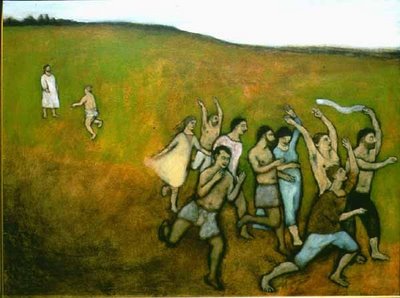
Hardship and gratitude. It is pretty difficult to see these two together. Is there a blessing wrapped in that hardship? As Jeremiah shares God's word to the exiles, God tells them to pray for their oppressors! Jesus heals ten lepers, but only one - and a special one at that - returns gratitude.
Not only do they go together in a strange kind of way, they are actually quite complimentary. A genuine spirit of gratitude can be the brakes that might lead someone over the edge into despair.
Jeremiah writes a letter to the exiles in Babylon. These folks have been carted off there after the brutal massacres inflicted on Judah and the city of God, Jerusalem, by the invading Babylonian army. Destroying Jerusalem and razing the Temple has left the Holy City in the hands of pagan conquerors. The exiles have lost everything and seen family members, friends, and neighbors slaughtered, and who have now been enslaved.
The letter includes three instructions, and one of them includes praying for the well-being of their oppressors. How can that be? Yet it all works together.
Jesus is confronted by 10 lepers seeking "mercy" (or healing). Jesus sends them to the priests, the ones who would pronounce their ritual status whether clean or unclean. He doesn't heal them there; they find themselves healed along the way.
One of the ten realizes something that the others don't get. The priests will pronounce them clean, but they had nothing to do with their healing. This one is moved to return to Jesus to express his deep gratitude. And this guy is a Samaritan, despised by the Jews of the day.
Jesus then praises him and pronounces him "well." That is not a good translation of the Greek word sozo. What it really means shows the spirit of gratitude revealing the full promise of God.
Get all the insights by watching the sermon video below.
Not only do they go together in a strange kind of way, they are actually quite complimentary. A genuine spirit of gratitude can be the brakes that might lead someone over the edge into despair.
Jeremiah writes a letter to the exiles in Babylon. These folks have been carted off there after the brutal massacres inflicted on Judah and the city of God, Jerusalem, by the invading Babylonian army. Destroying Jerusalem and razing the Temple has left the Holy City in the hands of pagan conquerors. The exiles have lost everything and seen family members, friends, and neighbors slaughtered, and who have now been enslaved.
The letter includes three instructions, and one of them includes praying for the well-being of their oppressors. How can that be? Yet it all works together.
Jesus is confronted by 10 lepers seeking "mercy" (or healing). Jesus sends them to the priests, the ones who would pronounce their ritual status whether clean or unclean. He doesn't heal them there; they find themselves healed along the way.
One of the ten realizes something that the others don't get. The priests will pronounce them clean, but they had nothing to do with their healing. This one is moved to return to Jesus to express his deep gratitude. And this guy is a Samaritan, despised by the Jews of the day.
Jesus then praises him and pronounces him "well." That is not a good translation of the Greek word sozo. What it really means shows the spirit of gratitude revealing the full promise of God.
Get all the insights by watching the sermon video below.
| 10-13-19-sermon.mp3 |
| 10-13-19-ff-answers.pdf |
| 10-13-19-remembering_gratitude.pdf |
